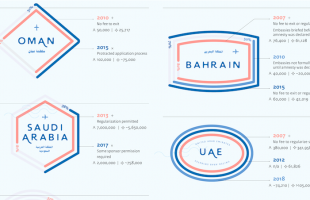India's National Domestic Workers Movement Confronts Violations of Migrants' Rights in the Gulf
A recent study produced by the National Domestic Workers Movement (NDWM) and Migrant Forum in Asia evidenced a spade of violations against GCC migrant workers originating from the Tamil Nedu region. Migrant Forum in Asia's Migrant Rights Violations Reporting System (MRVRS) provided documentation for the study, finding the highest number violations occurred in the United Arab Emirates; in the past three years, 446 migrant workers from the Tamil Nadu region alone experienced some form of abuse in the UAE. The study also found increasing violations against Tamil workers in Kuwait.
Overall, the highest number of violations against Tamil Nedu workers occurred in the Middle East; 251 cases of violations were documented in Qatar, 70 in Saudi Arabia, 64 in Oman, 71 in Kuwait, 51 in Jordan, 47 in Iran, and 28 in Iraq. In the East Asian region, Malaysia tallied the highest number of violations against Tamil migrants. Most violations occurred against low-wage workers such as domestic workers, construction workers, factory workers, and manual laborers.
NDWM has documented the vulnerabilities of Indian migrants in the Gulf for the past 8 years, and in October 2013 organized a press conference to share the experiences of former Gulf migrant workers. Manikam, a 45-year-old woman from Villupuram, shared this story: though she had been hired for elderly care, she was instead forced to perform domestic work. When she refused, Manikam was beaten and tortured. Nadiya, a 30-year-old former domestic worker, spoke of the suffering she endured after escaping abuse. Nadiya’s recruitment agent threatened her to prevent her from initiating legal action against her employer. Domestic workers like Nadiya and Manikum continue to be denied justice and victim-centered assistance by Gulf authorities as well as migrants’ foreign embassies.
NDWM issued a statement calling on the Indian government to recognize these abuses. NDWM urged the Indian government and to crackdown on agencies that facilitate the exploitation of workers and strengthen recruitment regulations.
According to a petition filed by the Migrant Rights Council in Hyderabad, there are 4,146 Indian nationals imprisoned in the Gulf but the Indian government continues to ignore their pleas for assistance. Most recently, 27 Gulf-employed Tamil fishermen were arrested by Iranian authorities after drifting across Iran's water-territory. 22 fishermen employed in Bahrain were also arrested for straying into the Qatar’s maritime territory. Tamil fishermen in the Gulf are frequently employed in exploitative conditions provided with no legal or financial assistance if arrested while on duty. The lack of legal or even administrative assistance from the Indian government can leave these workers stranded for years.




